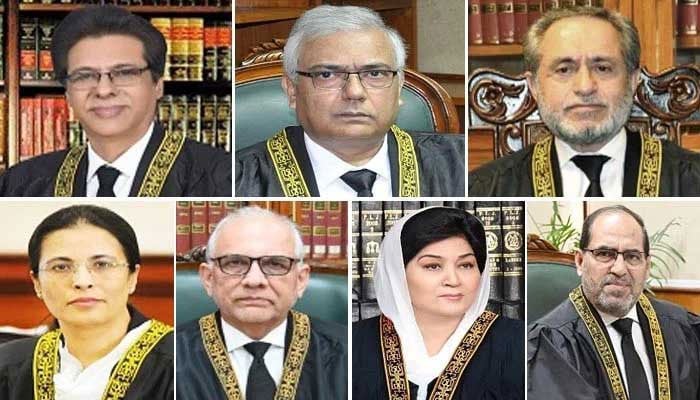Constitutional bench dismisses majority of cases
Seven-member constitutional bench headed by Justice Amin-ud-Din Khan heard scores of cases
ISLAMABAD: The Constitutional Bench Wednesday dismissed majority of cases for not being maintainable, upholding the objections raised by the Registrar’s Office.
A seven-member constitutional bench — headed by Justice Amin-ud-Din Khan — heard scores of cases. The other members of the bench were Justice Jamal Khan Mandokhel, Justice Muhammad Ali Mazhar, Justice Ayesha A Malik, Justice Hasan Azhar Rizvi, Justice Naeem Akhtar Afghan and Justice Musarrat Hilali.
Hearing a matter related to the seniority of judges in the Lahore High Court, the bench disposed of Justice Farrukh Irfan’s petition for being infructuous and held that the principle of seniority would be settled in future in another case.
Similarly, the bench also heard a plea against declaring the Sunni Ittehad Council (SIC) as a parliamentary party. The petitioner, Maulvi Iqbal Haider, told the court that he had filed the petition well on time but the review was pending. “You want the court to do something illegal,” Justice Jamal Khan Mandokhel told the petitioner saying it was up to the candidate which party he wished to join and which not.
Meanwhile, the bench dismissed the petition and upheld the objection raised by the Registrar Office to the petition. Hearing a case concerning a litigant’s access to the apex court, Justice Jamal Khan Mandokhel asked the counsel for the petitioner that they were hearing him directly in the open court and asked what he intended to achieve more than that.
The judge expressed annoyance over the global forum’s ranking of Pakistan’s judiciary. “Some say Pakistan ranks No 120, while some say it is on 150th number. It is not known where these numbers come from,” Justice Mandokhel remarked. Later, the court dismissed the petition.
Meanwhile, the bench dismissed a petition as non-maintainable seeking dismissal of government officials for not discharging their designated jobs and duties delinquently.
Justice Ayesha A Malik advised the petitioner to identify the specific officials in question and approach the relevant authorities for action. Similarly, Justice Muhammad Ali Mazhar observed that the petitioner had failed to mention any specific government officials in their application. Justice Jamal Khan Mandokhail asked the petitioner about which particular task had not been completed, urging him tell the court.
The bench dismissed the petition for not being maintainable Likewise, the constitutional bench also dismissed a plea seeking determining a time-frame for conclusion of trial in courts. During the hearing, Justice Ayesha A Malik observed that several laws, including those related to criminal cases, already specify time frames. Justice Ayesha advised the petitioner to approach parliament for legislation on the matter if further measures were required. The petitioner, however, contended that most of the trials often take 20 to 40 years to conclude. Justice Ayesha asked the petitioner to refrain from making sweeping allegations adding that although the system was not perfect, progress was being made in this regard. She observed that the petition pertained to the national judicial policy and clarified that the court could not issue directives under Article 184(3) of the Constitution. Justice Ayesha asked the petitioner to engage with the ongoing reform efforts rather than seeking the court’s intervention, as it did not fall within its purview. She also pointed out that the Law and Justice Commission was the appropriate forum for addressing judicial reforms. Similarly, Justice Jamal Khan Mandokhel reiterated that the judiciary operates within the bounds of the Constitution and law.
-
 Jennifer Aniston Already Decided Her Wedding Dress?
Jennifer Aniston Already Decided Her Wedding Dress? -
 Prince Harry, Meghan’s Hollywood Party Drama Exposes Chaotic PR Strategy
Prince Harry, Meghan’s Hollywood Party Drama Exposes Chaotic PR Strategy -
 Jennifer Garner Reacts To Savannah Guthrie's Video As Search For Nancy Guthrie Continues
Jennifer Garner Reacts To Savannah Guthrie's Video As Search For Nancy Guthrie Continues -
 Bad Bunny Leaves Fans Worried With Major Move After Super Bowl Halftime Show
Bad Bunny Leaves Fans Worried With Major Move After Super Bowl Halftime Show -
 Captain Jason Talks Personal Hardships He Faced Ahead Of 'Below Deck' Season 4
Captain Jason Talks Personal Hardships He Faced Ahead Of 'Below Deck' Season 4 -
 Anti-monarchy Group Reacts To Prince William, Kate Middleton Statement On Epstein Scandal
Anti-monarchy Group Reacts To Prince William, Kate Middleton Statement On Epstein Scandal -
 Andrew 'must' Apologize Not Wider Royal Family For Jeffrey Epstein Links
Andrew 'must' Apologize Not Wider Royal Family For Jeffrey Epstein Links -
 Super Bowl 2026: Why Didn't Epstein Survivors Ad Air On TV?
Super Bowl 2026: Why Didn't Epstein Survivors Ad Air On TV? -
 'Harry Potter' TV Series Exec Teases 'biggest Event In Streaming': Deets
'Harry Potter' TV Series Exec Teases 'biggest Event In Streaming': Deets -
 Camila Mendes Finally Reveals Wedding Plans With Fiancé Rudy Mancuso
Camila Mendes Finally Reveals Wedding Plans With Fiancé Rudy Mancuso -
 Beatrice, Eugenie Blindsided By Extent Of Sarah Ferguson’s Epstein Links
Beatrice, Eugenie Blindsided By Extent Of Sarah Ferguson’s Epstein Links -
 Girl And Grandfather Attacked In Knife Assault Outside Los Angeles Home
Girl And Grandfather Attacked In Knife Assault Outside Los Angeles Home -
 Super Bowl Halftime Show 2026: What Did Trump Say About Bad Bunny?
Super Bowl Halftime Show 2026: What Did Trump Say About Bad Bunny? -
 Piers Morgan Defends Bad Bunny's Super Bowl Performance, Disagrees With Trump Remarks
Piers Morgan Defends Bad Bunny's Super Bowl Performance, Disagrees With Trump Remarks -
 Andrew Lands In New Trouble Days After Royal Lodge Eviction
Andrew Lands In New Trouble Days After Royal Lodge Eviction -
 Instagram, YouTube Addiction Case Trial Kicks Off In California
Instagram, YouTube Addiction Case Trial Kicks Off In California




